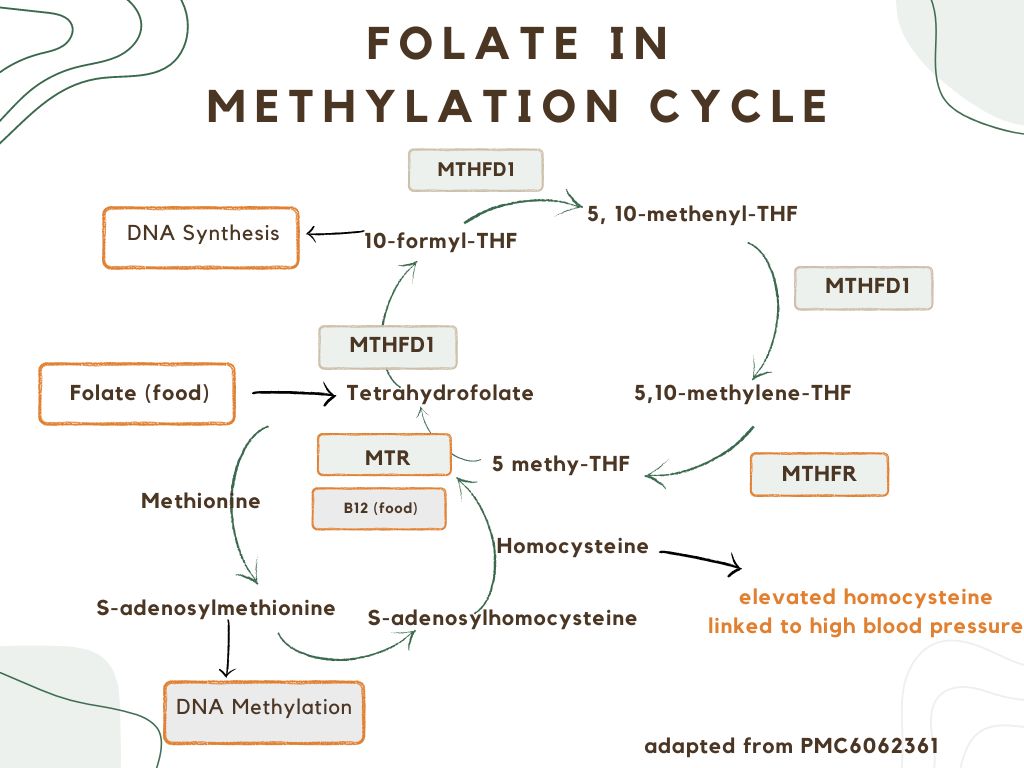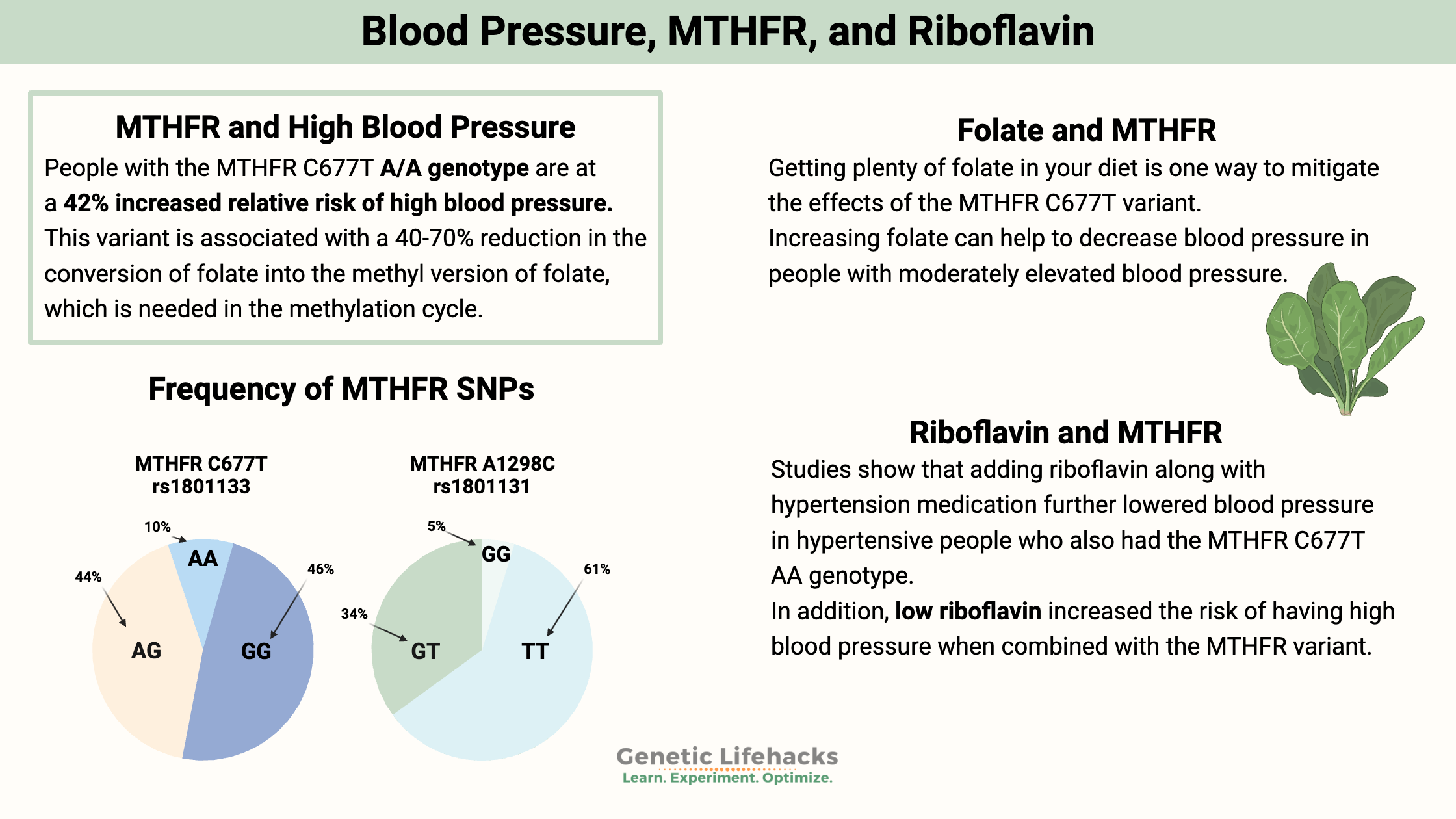Key takeaways:
~ A common MTHFR variant increases the relative risk of high blood pressure.
~ Diet and/or supplements can help mitigate the risk and lower high blood pressure.
MTHFR and High Blood Pressure
Do you deal with higher blood pressure? One gene linked to hypertension is MTHFR, and understanding your risk here can help you with natural ways to target blood pressure.
Quick background: The MTHFR gene encodes an enzyme called methylenetetrahydrofolate reductase, which converts folate from food into the methylate version (5-methyltetrahydrofolate) needed in the methylation cycle. The C677T variant reduces the conversion of folate into the methyl version of folate by 40-70%. 5-methyltetrahydrofolate is a primary way cells obtain methyl groups, which are used in many cellular reactions.
People with the MTHFR C677T A/A genotype were at a 42% increased relative risk of high blood pressure, according to a new study of over 6,000 adults. This study defined high blood pressure as systolic >140 and diastolic >90mmHg.[ref]
Importantly, the study results showed that a deficiency in riboflavin – along with the C677T variant – increased the risk of hypertension by 3-fold.[ref]
Riboflavin is vitamin B2, and folate is known as vitamin B9. Together these two B-vitamins interact with the MTHFR C677T AA genotype to significantly impact the risk of high blood pressure.
What if you just have one copy of the MTHFR C677T variant (A/G genotype)?
A meta-analysis combining data from 30 studies showed that carrying even one copy of the variant increased the relative risk of hypertension by 30%.[ref]
Does the MTHFR A1298C variant also increase the risk of high blood pressure? The MTHFR A1298C variant decreases enzyme function by about 10-20%. However, most studies show no statistical link between high blood pressure and MTHFR A1298C.[ref]
Why does MTHFR impact blood pressure?
MTHFR is important in hypertension in a couple of ways:
High blood pressure can be caused by the narrowing of the arteries by atherosclerosis. High levels of homocysteine are linked to increased atherosclerosis, and the MTHFR variants are linked to high homocysteine.[ref] Homocysteine needs to be recycled back to methionine with the help of MTHFR, folate, and B12.
Here’s an overview of the methylation cycle, showing how MTHFR is needed to convert homocysteine to methionine.

In addition to homocysteine, MTHFR also modulates nitric oxide synthase 3 (NOS3), which is the nitric oxide-producing enzyme. In the endothelial cells lining the blood vessels, nitric oxide regulates blood pressure by causing the relaxation of blood vessels.[ref] When more nitric oxide is released in the endothelium, blood pressure is lower.
Riboflavin also plays a role:
FAD (flavin adenine dinucleotide) is a cofactor for MTHFR, and riboflavin is the precursor for FAD. It makes sense that low riboflavin would exacerbate folate insufficiency when combined with the MTHFR C677T variant.
In addition to the study showing that low riboflavin increased the risk of having high blood pressure when combined with the MTHFR variant, clinical trials show adding in more riboflavin can help to reduce blood pressure.
MTHFR C677T Genotype Report:
Lifehacks:
The obvious solution here is to dial in your folate and riboflavin to the right levels for you.
Here are some of the options for increasing folate and riboflavin:
Related Articles and Topics:
CYP11B2 and High Blood Pressure:
Learn how CYPB11 variants impact aldosterone and blood pressure.
Lithium Orotate and Mood:
Find out how low-dose lithium orotate interacts with vitamin B12 and can impact mood for some people.
Estrogen, histamine, and mast cells:
Mast cells have estrogen receptors and may be more easily triggered when estrogen (or estrogen-mimicking compounds) are high.
Lipoprotein a: How to check your genetic data
High Lp(a) levels are a big risk factor for sudden heart attacks. Your Lp(a) levels are mainly controlled by your genetic variants. Check to see if you carry genetic variants that increase or decrease Lp(a).
References:
Cronometer | Discover Your Nutrition. https://cronometer.com/. Accessed 25 Oct. 2022. Fohr, Iris P., et al. “5,10-Methylenetetrahydrofolate Reductase Genotype Determines the Plasma Homocysteine-Lowering Effect of Supplementation with 5-Methyltetrahydrofolate or Folic Acid in Healthy Young Women.” The American Journal of Clinical Nutrition, vol. 75, no. 2, Feb. 2002, pp. 275–82. PubMed, https://doi.org/10.1093/ajcn/75.2.275. McMahon, Amy, et al. “Novel Approaches to Investigate One-Carbon Metabolism and Related B-Vitamins in Blood Pressure.” Nutrients, vol. 8, no. 11, Nov. 2016. www.ncbi.nlm.nih.gov, https://doi.org/10.3390/nu8110720. McNulty, Helene, et al. “Riboflavin, MTHFR Genotype and Blood Pressure: A Personalized Approach to Prevention and Treatment of Hypertension.” Molecular Aspects of Medicine, vol. 53, Feb. 2017, pp. 2–9. PubMed, https://doi.org/10.1016/j.mam.2016.10.002. Office of Dietary Supplements – Riboflavin. https://ods.od.nih.gov/factsheets/Riboflavin-HealthProfessional/. Accessed 25 Oct. 2022. Qian, Xiao-lin, et al. “The Prevalence, Relative Risk Factors and MTHFR C677T Genotype of H Type Hypertension of the Elderly Hypertensives in Shanghai, China: A Cross-Section Study.” BMC Cardiovascular Disorders, vol. 21, Aug. 2021, p. 376. PubMed Central, https://doi.org/10.1186/s12872-021-02151-x. Solis, Claudia, et al. “Folate Intake at RDA Levels Is Inadequate for Mexican American Men with the Methylenetetrahydrofolate Reductase 677TT Genotype.” The Journal of Nutrition, vol. 138, no. 1, Jan. 2008, pp. 67–72. PubMed Central, https://www.ncbi.nlm.nih.gov/pmc/articles/PMC2646848/. Ward, Mary, et al. “Impact of the Common MTHFR 677C→T Polymorphism on Blood Pressure in Adulthood and Role of Riboflavin in Modifying the Genetic Risk of Hypertension: Evidence from the JINGO Project.” BMC Medicine, vol. 18, Nov. 2020, p. 318. PubMed Central, https://doi.org/10.1186/s12916-020-01780-x. Williams, Carolyn, et al. “Folic Acid Supplementation for 3 Wk Reduces Pulse Pressure and Large Artery Stiffness Independent of MTHFR Genotype.” The American Journal of Clinical Nutrition, vol. 82, no. 1, July 2005, pp. 26–31. PubMed, https://doi.org/10.1093/ajcn.82.1.26. Wilson, Carol P., et al. “Blood Pressure in Treated Hypertensive Individuals with the MTHFR 677TT Genotype Is Responsive to Intervention with Riboflavin: Findings of a Targeted Randomized Trial.” Hypertension (Dallas, Tex.: 1979), vol. 61, no. 6, June 2013, pp. 1302–08. PubMed, https://doi.org/10.1161/HYPERTENSIONAHA.111.01047. Wu, Yi-Le, et al. “Association between Methylenetetrahydrofolate Reductase (MTHFR) C677T/A1298C Polymorphisms and Essential Hypertension: A Systematic Review and Meta-Analysis.” Metabolism: Clinical and Experimental, vol. 63, no. 12, Dec. 2014, pp. 1503–11. PubMed, https://doi.org/10.1016/j.metabol.2014.10.001. https://www.hsph.harvard.edu/nutritionsource/riboflavin-vitamin-b2/. Accessed 25 Oct. 2022.Debbie Moon is the founder of Genetic Lifehacks. Fascinated by the connections between genes, diet, and health, her goal is to help you understand how to apply genetics to your diet and lifestyle decisions. Debbie has a BS in engineering from Colorado School of Mines and an MSc in biological sciences from Clemson University. Debbie combines an engineering mindset with a biological systems approach to help you understand how genetic differences impact your optimal health.

